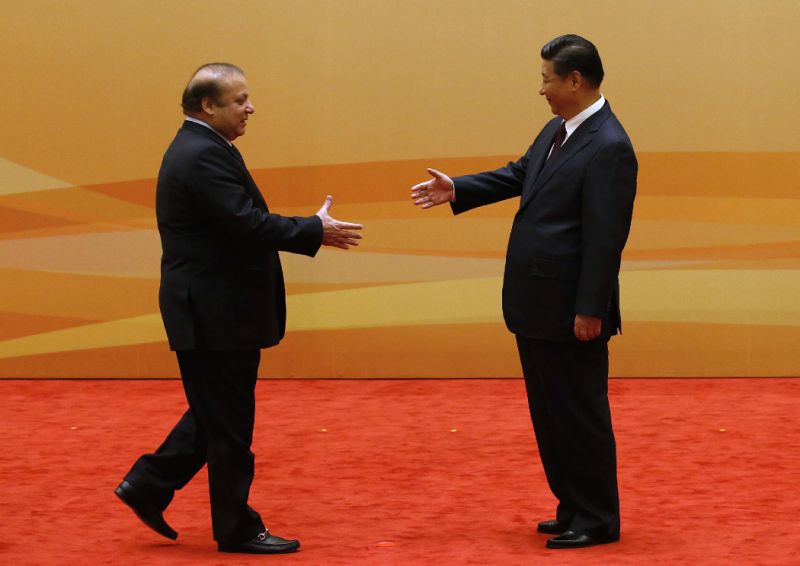
ISLAMABAD: India’s opposition to the China-Pakistan Economic Corridor (CPEC) stems from its fear of internationalisation of the Kashmir dispute and the growing influence of China in the Indian Ocean, says a new report by one of the most influential global think tanks.
“There is considerable concern within India that China, which has been neutral on Kashmir since 1963, can no longer be so now that its economic and security interests in these territories are growing in stake,” says a report by the Stockholm International Peace Research Institute (Sipri) — a Sweden-based think tank.
The report — titled “Silk Road Economic Belt – considering security implications and the EU-China cooperation prospects” — argues that India does not want a mediating role for China in these disputes.
It is the first report by any global think tank that has discussed in detail the Indian concerns on CPEC. The report has also shed light on implications of the ‘One Belt One Road’ initiative on security dynamics and its compatibility with the EU interests.
The Sipri report says CPEC has raised political temperatures between India and Pakistan. “India strictly opposes CPEC, and while the Economic Belt is not a harbinger of a new conflict, it has so far intensified historic competition over influence in South Asia,” note authors of the report.
The report argues that there is a factual and conceptual objection to CPEC in India. The factual objection is that India does not want to internationalise the Kashmir dispute it has with Pakistan. Chinese activity in the disputed areas automatically makes it a stakeholder in these disputes.
At the conceptual level, CPEC allows China to gain a toehold in the Indian Ocean through direct access to the Arabian Sea. There remain concerns that this might develop a military dimension at some stage, according to the report.
Since territorial compromise from either India or Pakistan is a political suicide for any of the ruling parties, it remains to be seen whether CPEC will contribute to a resolution of this dispute or further fan the flames. There is also a concern in India that China will use Gwadar port to observe Indian naval activity and possibly even exploit it for an expansion of China’s own naval presence.
There is also concern in India that while CPEC in the short and medium term could be an opportunity to generate jobs and growth in Pakistan, over the longer term its strategic consequences could reshape the regional balance of power in favour of China and limit India’s geopolitical reach.
The assertiveness and swiftness of Chinese actions in the South China Sea have implanted a preoccupation among China’s critics in India that if China gains a foothold in the Arabian Sea and, as an extension, in the Indian Ocean through Gwadar, it might make national interest claims in India’s maritime sphere too. “After all, if Gwadar grows to be the immense port China envisions it to become, China will need to take on a bigger direct or indirect security role,” it says.
The Sipri report noted that unlike in India, CPEC has not raised concerns in Afghanistan. Afghanistan is open to all regional initiatives that could reactivate its ailing formal economy, whether that is by way of CPEC or India-led efforts to connect with the Afghan economy through the Chabahar Port in Iran. Iran has not opposed CPEC and has expressed strong interest in the Belt and Road Initiative.
However, the report argues that Afghanistan is unlikely to benefit from CPEC unless Kabul-Islamabad relations improve. For this to happen, Pakistan’s security concerns with regard to Afghanistan need to be assuaged. The authors note that CPEC has the potential to exacerbate three fault lines in South Asian security.
The first is between China and India themselves. The second is between China-Pakistan on the one side and India on the other. The third is between China and India and its partners – the US, Japan and, to a lesser degree, Vietnam. The region of Balochistan is being geopolitically instrumentalised by these various players, they added.
It says that this is an evidence that CPEC has contributed to political and security bloc formation, but the bloc rivalry between the US-India and China-Pakistan exists regardless of CPEC. CPEC has merely strengthened the strategic Chinese-Pakistani alliance.
China’s reliance on CPEC means that it needs a stable and amicable Pakistan, underlines the report. “The Silk Road Economic Belt initiative may become one of the cornerstones of Asian economic growth and integration, and eventually of closer political and security cooperation among states, but the pathway to this scenario is long and fraught with obstacles,” it says.
Source: The Express Tribune

